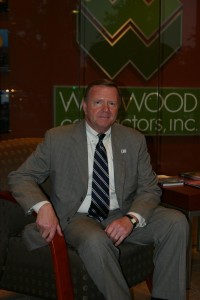One could almost hear a collective harrumph in the arts community when Bob Benda’s name came up as the arts funding task force chair in December. Benda is CEO at Westwood Contractors Inc. What did a construction guy know about the arts? And he made it clear early on that he didn’t like the arts relying on financial support from the general fund.
“I don’t think that when he got on the task force he was pro-city funding for the arts,” Ulich said.
Her assessment was correct.

“I’m a businessperson,” Benda said, “and one of the reasons the mayor asked me to head up the task force is I have a fairly fiscally conservative approach to spending money. My position was, as worthy as [the arts] may be, if we don’t have the money to fund them responsibly, that is the harsh reality of our current economy.”
For the next 90 days, the 12 members (including noted arts lover Robert Bass, brother to Ed) met every two weeks to hash out ideas for funding the arts. The group held five public hearings. They looked at the city’s history and analyzed the impact of the arts on the local economy. They compared funding in other cities, as arts patrons looked on skeptically.
During public hearings, citizens reminded the task force that arts funding had been sliced repeatedly since the recession began in 2007, until only $650,000 a year from a city budget of $1.4 billion was being given to the Arts Council to spread out among various arts organization.
Benda and other business-minded task force members didn’t like having the arts compete each year with police, fire, and street maintenance for the same pool of money. “We started turning over rocks, looking for undercommitted resources of revenue,” he said.
That search led to the natural gas trust fund, money that has been accumulating from gas royalties earned from wells drilled under city property. The city developed the trust as an emergency fund after the shale drilling boom began about 10 years ago. “Our recommendation was that a percentage of the annual earnings from that trust fund be dedicated to arts funding,” Benda said.
For this year, the city council accepted the task force’s recommendation to provide $650,000 from the general fund and another $450,000 from the trust fund, almost doubling city-provided arts funding in 2014, to about $1.1 million. Over the next 10 years, the arts funding taken from the city’s general fund will slowly decline until it is solely funded through the trust, Benda said. The task force also recommended that total funding be gradually increased to more than $3 million.
While $1.1 million doesn’t have Arts Council members doing cartwheels, Ulich is relieved that city officials showed a willingness to listen and, subsequently, give more money. She credits the mayor for taking action.
“Fort Worth is growing up,” Ulich said. “The task force was the result of the arts community standing up and saying, ‘You need to listen to us.’ As long as we work together, we are liable to make ourselves a world-class city whether we like it or not.”
Arts organization leaders who work closely with the city don’t do themselves any favors by publicly criticizing what the city does. Other arts employees, however, are willing to speak freely when given anonymity. They say that even with the recent bump in annual funding, the city is still giving short shrift to the arts.
For instance, most major cities in Texas fund their arts through hotel occupancy taxes. Museums, ballets, and symphonies attract tourists who fill up hotels. It seems reasonable that the arts should get a chunk of that tax money. Austin, Houston, and San Antonio fund their arts that way and at higher levels than Fort Worth.
“Fort Worth is getting to a level where we need to be in the running with Houston, Austin, Dallas, and San Antonio,” said a member of a local arts organization who asked not to be named. “There is no reason why we shouldn’t be in the same cultural [situation as] those other cities. We are so far below those cities in funding.”
On the other hand, the city also provides valuable in-kind services, such as maintaining the Fort Worth Community Arts Center. And while the city has provided about $6 million to the Arts Council in the past 10 years, it’s also invested about $20 million in public art and another $10 million in other cultural organizations during that period. The study’s comparison of arts funding in other cities focused on funding provided to arts councils.
Arts Council studies show that Fort Worth has been spending 94 cents per capita on the arts. That figure will just about double once the new funding kicks in. Still, even that will fall well short of the $6.34 per capita spent in Austin and the $5.98 per capita spent in San Antonio. Houston spends $2.33 per capita.
Fort Worth, the arts enthusiast said, “didn’t really increase the funding — they just leveled the playing field to where it was a few years ago. It’s a step in the right direction, but it’s not going to solve the problems, especially with that funky funding line.”
The “funky funding” comment refers to concerns about the reliability of a trust fund fed with natural gas royalties. While the task force was developing a funding plan dependent upon oil and gas royalty checks, Fort Worth Weekly staff writer Peter Gorman was researching and writing a story that looked at the potential for instability in that pot of money (“Shale Game,” March 13, 2013). Gorman’s article examined the energy industry’s overestimation of U.S. gas reserves, market gluts, falling prices, and the impact on future royalties.
Gorman quoted geologist David Hughes saying that many gas wells will run dry in 10 years or so, compared to 30 or 40 years of well life originally predicted by industry officials. The city’s efforts to move arts funding away from the general fund will help get the arts community through at least a few tough budget years, but some arts lovers say the city will eventually need to commit to a consistent yearly amount from its general fund to provide solid financial footing in the future.
Ulich said city officials have assured her that the trust fund will provide a stable source of funding, but she wonders. The task force’s final report included recommendations that the city increase its art funding to $3 per capita in the near term and to $4.50 in the long term by slowly shifting all of the arts funding from the general fund to the trust fund. The long-term increase “would not make us a leader,” the report said. “Rather it would place us at the average of our large population peer cities.”
Ulich is well aware that comparable cities give more to their arts programs and organizations. Fort Worth would have to provide about $3 million a year to the arts to get in line with other cities. But times are tough. Libraries, swimming pools, parks, and others are also seeing cuts.
Having the city council double the arts budget rather than slashing it further provided Ulich with a sense of relief, if temporarily. “You’re never content,” she said. “Otherwise I’d be out of a job. But it’s a step in the right direction.”
********











The Bass family is ruthless when it comes to putting pressure on the City. They manipulate and crush anything that gets in their way. Bob Bass is the worst, the other brothers fall in line.
Give me a call and tell me more (you can be a confidential source).
jeff — 817-321-9709
What “big” events are going to be at this arena? Compared to Dallas, Fort Worth doesn’t get many “big” events. I doubt if this will change that.
You all act suprised. When the Bass boys say “Jump!” Fort Worth & Tarrant county public employees, elected & appointed officials who know which side their bread is buttered on better say “How high!?!”
The real question is how much of this public money the Bass boys were able to skim into their pockets via front & shell companies they control, etc.
Shhhh. The Basstapo might be listening.
Fort Worth is run by a bunch of Bass.
Holes.
My thought’s about the Bass Family are very different from the previously posted comments. I am grateful that the Bass Family take the time and have the foresight to build Fort Worth into a model city and help push our economy during challenging times.
Good reporting, Jeff.